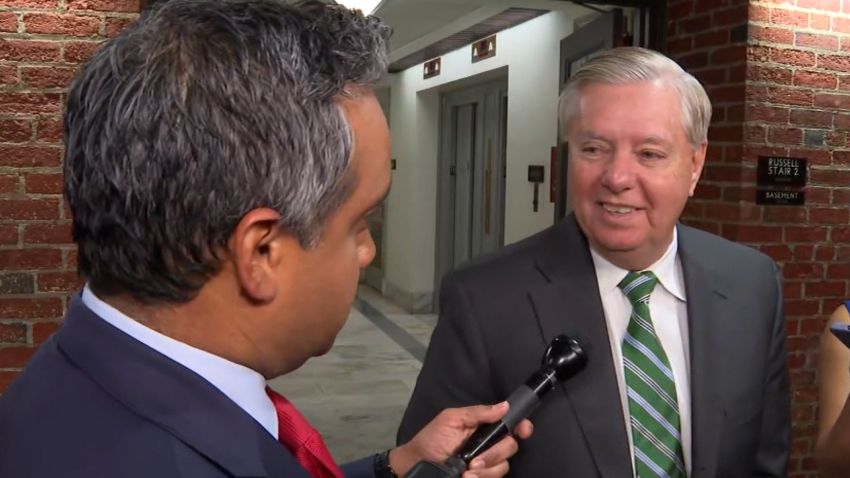
CNN
—
Donald Trump is facing a flurry of criticism on Capitol Hill, with Republican fury growing over their failure to take back the Senate and GOP leaders at odds over their strategy with the former president still maintaining a dominant hold on the party.
The GOP reckoning comes in the wake of the party leaving another critical Senate seat on the table – Georgia – and seeing Democrats expand their majority to 51-49.
Hours after Trump’s hand-picked candidate, Herschel Walker, failed to pick up a Democratic seat, the blame game began in earnest – in large part directed at the former president. Many argued that the party establishment must take a heavier hand in the 2024 election cycle and root out unelectable Republicans even if they’re backed by Trump. Others said the GOP needs to embrace early voting and wholly reject Trump’s demagoguery of mail-in voting, something that helped power Democratic victories.
And some top Republicans said the party’s refusal to reject Trump as their standard bearer – combined with the 2020 election denialism that is central to his platform – ultimately did them in and will cost them again in future cycles.
“It’s just one more data point in an overwhelming body of data that the Trump obsession is very bad for Republicans, but normal Republicans are doing extremely well,” said retiring GOP Sen. Pat Toomey of Pennsylvania, whose open seat was picked up by a Democrat.
The Republican soul-searching comes at a critical moment for Trump and the party. Senate GOP leaders are eager to move on from the Trump years and court candidates who have more moderate and mainstream appeal to the suburban voters who left them over their disdain for the former president.
But they are up against a powerful and vocal Trump-aligned faction within their party – especially in the incoming House GOP majority, where a hard-right bloc now holds major sway over GOP leader Kevin McCarthy and his pursuit of the speakership – as they argue the party needs to return to its bedrock conservative principles.
And for Trump, the loss in Georgia is the latest in a growing list of political problems that has caused a new rift within his party and raised major questions about his viability as a 2024 presidential candidate. In the wake of his Mar-a-Lago dinner with prominent antisemites, and subsequent call for the “termination” of the US Constitution, many on Capitol Hill see the loss in Georgia – along with shortfalls in Nevada, Arizona and Pennsylvania – as the final breaking point between him and his party.
Even a staunch ally, Sen. Lindsey Graham of South Carolina, said Trump needs to convince his party that he can turn things around.

Hear what Lindsey Graham said about some GOP blaming Trump for party losses
“I think he’s in a good spot to get the nomination, but he’s got to prove to people he can win,” Graham told CNN. “And the more people get in the race, I think probably the better, because you’ll have some points of comparison.”
Graham added: “He’s still very popular in the party. People appreciate his presidency. They appreciate his fighting spirit. But there’s beginning to be a sense, can he win?”
Others were far more skeptical.
Sen. John Thune of South Dakota, the No. 2 Republican, said the GOP tried to focus the 2022 midterms on President Joe Biden and Democratic policies they argued were making inflation worse and intensifying problems at the US-Mexico border. But when Trump stumped for candidates late in the campaign season, as he did for Republican Senate nominees Adam Laxalt in Nevada and Mehmet Oz in Pennsylvania, it gave Democrats fresh ammunition on the trail.
“In an election year where it should have been a referendum on the current administration and their policies, the Dems were in many cases able to turn it into a choice election because of Trump’s presence out there,” Thune told CNN. “So was he a factor? I don’t think there’s any question about that.”
Thune took his criticism further.
“A lot of the candidates who had problems in these elections were running on the 2020 election being stolen and I don’t think independent voters were having it,” Thune said.
Not everyone agreed.
“When I talked to voters … what they wanted to know is if their votes are never going to be diluted,” said Sen. Rick Scott, the Florida Republican and outgoing chairman of the National Republican Senatorial Committee. “I think that’s what was really important.”
Amid the strategic decisions now under discussion: Whether to engage more forcefully in the 2024 primary season to avoid the problems of 2022. In the next cycle, Republicans have a far more favorable Senate map, with Democrats defending 23 seats and Republicans defending 11 seats. Three of those Democratic seats – Ohio, Montana and West Virginia – are in states that Trump won twice.
“Still got to talk to my wife but we’ll let you know when we do make the decision,” Sen. Jon Tester, a Montana Democrat, said Wednesday when asked if he’d run to defend the seat he’s held since 2007.
But the potential GOP primary in his state could offer a preview of how Republicans will handle intraparty clashes going forward. Some want a heavier hand to eliminate candidates they view as unelectable, a contrast from the 2022 cycle when Scott opted not to engage in primaries through the NRSC.
The new incoming chairman, GOP Sen. Steve Daines of Montana, appears to have a different view.
“Clearly you want to see candidates who can win general elections and we’re going to keep working that in,” Daines said.
Some say a new approach is desperately needed.
“We need better candidates,” said Sen. Roy Blunt, a Missouri Republican who is retiring.
And others blame the candidates’ strategies.
“I think the fundamental lesson is it takes one kind of campaign to win a primary and it takes another kind of campaign to win a general election,” said Texas Sen. John Cornyn, a member of GOP leadership. “And when you try to run a general election like you run in a primary, without appealing to a broader base of the electorate, then you’re going to lose.”
“We’ve seen that over and over and over again,” he added.
But Scott contended they had “good quality people” who ran this cycle as he defended his decision to stay out of primaries.
“Well, I think we’ve got to rely on the voters in the states,” Scott said. “It’s their states. I trust the voters.”
Scott, who clashed with Senate GOP leader Mitch McConnell this year over embracing a policy agenda that the Kentucky Republican repudiated, said the GOP needs to focus on another matter: Having a “good national message.”
“I believe we ought to have our Republican agenda and give people a real purpose for how to vote – why to vote for us.”
Despite the disagreement over Trump, Republican senators up-and-down the line agreed that the party needs to put a renewed focus on mail-in voting, something that Trump demonized over the past few years.
“We’ve got to find a way to get out the early vote with our voters,” said Sen. Joni Ernst, a Republican of Iowa.
But that could require confronting Trump, something GOP Sen. Mitt Romney of Utah said is well overdue.
“I think President Trump has had a very substantial impact on who’s going to win a primary and it hasn’t worked out well,” he said. “Hopefully, we’ll recognize that his endorsement can be the kiss of death.”
